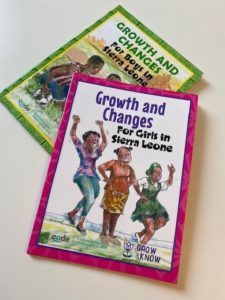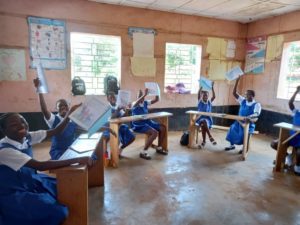Puberty is a stage of life that stands out for many of us: it can be full of awkwardness and can raise many questions about the physical and social changes happening so quickly in a short span of time.
To help children and youth navigate what can be a challenging and confusing time in their lives, they need access to accurate and age-appropriate learning resources.
A lot of the learning materials related to puberty have primarily been produced in western countries like Canada, the United States, and parts of Europe. In developing countries, greater resources have been invested in sexual and reproductive health, leaving a gap in the availability of locally-relevant puberty education.
 Growth and Changes is a series of two books (one for girls and one for boys) developed through CODE’s Transforming Girls’ Education Program, also known as TGEP. These books were developed in close collaboration with Grow and Know, a charitable organization that works to empower boys and girls with knowledge of their changing bodies through the creation of locally-relevant puberty resources.
Growth and Changes is a series of two books (one for girls and one for boys) developed through CODE’s Transforming Girls’ Education Program, also known as TGEP. These books were developed in close collaboration with Grow and Know, a charitable organization that works to empower boys and girls with knowledge of their changing bodies through the creation of locally-relevant puberty resources.
In the coming months we will be distributing thousands of copies of Growth and Changes for free to children in grades 5 and 6 in Sierra Leone. The books were designed with input from teachers, parents, the Ministries of Education and Health in Sierra Leone and most importantly from students. The books are structured for self-guided learning so students can learn by reading them on their own, with their parents or in their classrooms.
We recently connected with Nancy Bangura, one of the local researchers in Sierra Leone who supported the development of these books. Nancy is a professional social worker, researcher and counsellor who focuses her practice on supporting women, children and vulnerable groups. She shared with us some field-level insights into the creation of these books and offered her thoughts on why it’s so crucial for youth and other members of the community to participate in the content creation.
Nancy facilitated participatory research activities with girls and boys between the ages of 16-18 and led sessions that enabled them to comfortably share their experiences and stories. They would talk about many puberty-related changes such as the first time they got their periods and what kinds of peer pressures they faced during these formative years. The stories and experiences of these older teens were then woven into the content of the books to make them very relatable for younger students entering puberty.
“It provide[d] the opportunity for the girls to share their experiences that would shape the spirit of the book […] The stories and experiences shared by older girls to be used by the younger ones in Sierra Leone could provide the perfect foundation for learning as it provides the socio-cultural elements of the Sierra Leone Society. So it is important for girls to participate in the development of these materials as it is for them and their younger sisters, and their stories are shaped by their experiences.”
 Through these research sessions, they also identified local myths about puberty and in particular about menstruation. An important consideration in writing the Growth and Changes books was being able to debunk harmful myths and stereotypes. Nancy shared some of their findings:
Through these research sessions, they also identified local myths about puberty and in particular about menstruation. An important consideration in writing the Growth and Changes books was being able to debunk harmful myths and stereotypes. Nancy shared some of their findings:
“When they are [menstruating] they are considered unclean and even when they pray their prayers are not answered. This account[s] for the reasons as to why women and girls [who are menstruating] are usually isolated because it brings ill luck. There is also the belief that using pads during menstruation may cause infertility to girls.”
Nancy shared with us that it was critical that both beneficiaries and stakeholders in Sierra Leone were involved in developing the books, because it gave them a sense of ownership over the contents as well as the assurance that the content is relevant to their community; they will therefore be more likely to use the books:
“The involvement makes them feel respected... [It’s a} chance to educate kids about sensitive issues on puberty using their local experiences, and not imported ideas or stories with western focus. And that will go a long way to determine the value the children and their parents will attach to these books.”


